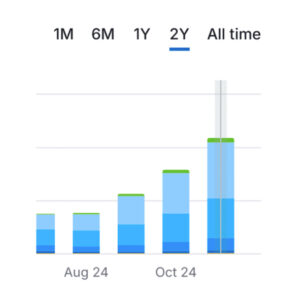Understanding Google's November 2024 Core Update
Google's November 2024 Core Update has made some more changes to how they evaluate and rank search results. Google regularly updates its algorithm to ensure users receive the highest quality content for the best search experience.
This update is just another step in Google's ongoing mission to make sure that genuinely helpful and relevant content gets the spotlight, while low-quality, keyword-stuffed pages fade into the background. This has led to ranking volatility over the last couple of weeks.
Key Changes and Focus Areas
- Enhanced Content Quality Metrics: Google has emphasized the importance of E-E-A-T (Experience, Expertise, Authority, and Trustworthiness). Websites with in-depth topic knowledge that are trustworthy, made by people who know what they're talking about, are likely to maintain or improve rankings.
- Alignment with Search Intent: Google matches content to search results that best aligns with user intent. This includes favoring websites that provide actionable, clear, and query-specific information over generic or overly optimized pages.
- Demotion of Thin Content: Pages that offer limited value for users or are over-optimized for SEO purposes, including excessive keyword stuffing, may observe a decline in their search engine rankings. Google's algorithm prioritizes content that is both comprehensive and user-friendly.
Initial Impact on Websites
Websites relying on content created solely for ranking purposes are likely to see a decline in search visibility. However, sites offering well-researched, user-centric content are likely to see improvements. This update reinforces consistency in topical representation and prevents larger publishers from using existing ranking authority to outrank smaller publishers in new categories. These outcomes underscore Google's commitment to user satisfaction over algorithm manipulation.
Recommendations for Recovery and Core Update Response
Search results are constantly changing as user expectations, search behaviors, and web content evolve. Google emphasizes that websites affected by the update may take several months to recover their rankings as its systems learn and validate improvements. Furthermore, making reactive changes does not guarantee a ranking recovery.
- Conduct a Content Audit: Identify underperforming or thin pages and work to improve their quality. Content should be original and engaging, and it should give users what they're searching for.
- Optimize User Experience: Address technical SEO issues like page speed, mobile-first design, and accessibility. These factors are key to maintaining rankings and encouraging visitors to interact with your content.
- Update Old Content: Complete content refreshes where necessary to remove outdated information on high-performing pages. This is essential to maintain relevance and align with current user needs.
- Build Niche Authority: Establish expertise in specific topics to enhance overall domain credibility. Google has also recently communicated that if a website publishes content that strays too far from its main topic, that content might experience downgraded rankings.
Most importantly, wait until the update is completed before analyzing the ranking impact.
Long-Term Strategy
Core updates often bring temporary volatility. Don't rush into making changes. Instead, use tools like Google Search Console to track your performance and identify areas for improvement.
Organic Keywords Trend
Here’s an example of a website that focuses on providing a great user experience and valuable content, supported by a holistic, long-term SEO plan, has seen immediate benefits from the update.

Want to connect about your Digital Strategy?
Fill out the form below and someone from our team will reach out to you to set up a time to connect.
Fields marked with * are required